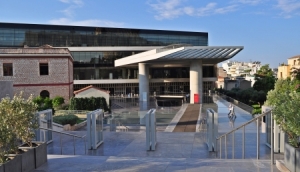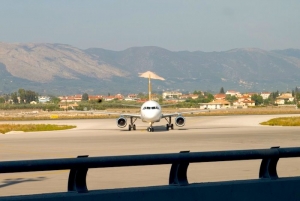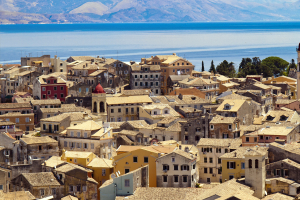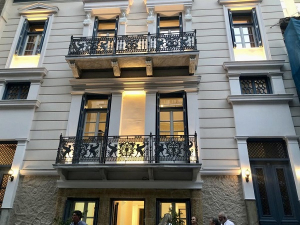BUSINESS CENTRE
XpatAthens
RyanAir Announces Improved Winter Schedule To Santorini
6 Month Child-Care Leave Provided To Fathers
According to a bill submitted to parliament in October, men will now also be granted child-care leave. It will be granted, if desired, by the insured individual, after the 4-month pregnancy and maternity leave of the mother.
The monthly amount paid to the beneficiary is up to 586 Euros and is paid by OAED. Note, the child-care leave can be taken by either the mother or father, but not both individuals.
Originally posted in Greek on NewMoney
International Museum Day 2016
Museums are vital for understanding the exchange of culture and they allow for a mutual respect and understanding of different cultures around the world. What better way to learn more about Greek culture and experience the city than through exciting events happening throughout Athens for IMD.
Source: ICOM
Fraport Steps In As Manager At 14 Greek Airports
US Cooking Show Highlights Gastronomy Of Pelion And Volos
Corfu Voted As The Best Filming Location In Europe
Well done Corfu!
Where To Find The Tastiest Melomakarona In Athens
Afoi Asimakopouloi

Credit: @afoi_asimakopouloi
Asimakopoulos is a landmark pastry shop in Athens that has survived for over 100 years thanks to the quality of its ingredients and respect for authentic flavors. Since it first opened in 1915, it has been offering mouth-watering pastries, cookies, and cakes, as well as savory pies for those who don’t have much of a sweet tooth. Melomakarona promise to take us on a culinary journey to the flavors that defined our childhood. This holiday season, don’t miss their Melomakarono Isli—a stuffed melomakarono filled with walnuts and sprinkled with Aegina pistachios. It’s a modern twist on a beloved classic!

Credit: @remoundos_bakery

Credit: @konstandinidis
Ta Gioulia

Credit: @ta_gioulia
This historic pastry shop in Nea Ionia, carries a legacy of authentic flavors inspired by its founder's Asia Minor roots. Their honey-soaked delights are stuffed with whole walnuts and are made to perfection with a unique syruping method. Made with honey from Agrinio, the melomakarona strike the perfect balance of juiciness without being overly dense, making them a standout choice for the holiday season.
Gellisimo Biscoto

Credit: @gellisimobiscoto
We’ve saved the best for last! While Gellissimo may not be the place to find traditional melomakarona, it’s where you’ll discover an exciting twist on the holiday classic. Treat yourself to their Melomakarono Praline, served with your choice of vanilla, Nutella, or—for the more adventurous—Melomakarona ice cream. It’s a modern and delicious way to enjoy the festive season.
Ziller Mansion Transforms Into Cultural Hub, Welcoming All
Originally published in Greek on: iefimerida.gr
Valia Zahariou - Heal Your Life Teacher & Wellness Programs Designer
As a certified Heal Your Life®️ Licensed Teacher, Workshop & Retreat Leader, I am a passionate wellness guide dedicated to supporting human journeys toward whole-being and harmony. My mission is to help conscious humans to align their body, mind, emotions, energy, and spirit.
I’d love to partner with you to craft transformative experiences that resonate deeply with your clients or community. Whether you need a one-on-one coaching, group workshops, or a full retreat, I’m here to bring my expertise to support your vision. Get in touch with me by email: valiazack@gmail.com.

Wellness Programs Designer
I specialize in full-spectrum healing, supporting physical, mental, emotional, and spiritual well-being, always customized to the individual’s unique needs.
Heal Your Life®️ Teacher
I lead powerful group workshops inspired by Louise L. Hay’s ground-breaking teachings. Offered both virtually and in-person at sacred locations, helping individuals shift limiting beliefs and embrace self-love.
Emotional Intelligence & Mindfulness Facilitator
I provide practical strategies to cultivate resilience, emotional balance, and inner peace in everyday life; this means tools you can use anytime, anywhere.
Transformational & Intuitive Guide
As an intuitive, I tailor my techniques to individuals and groups, helping release limiting beliefs, strengthen self-worth, and align with your soul’s true purpose.
![]() WhatsApp/Viber: +30 698 339 0026 / +27 84 651 9055
WhatsApp/Viber: +30 698 339 0026 / +27 84 651 9055
A Surprising Experience
Hi XpatAthens. My name is Anna and I subscribe to your newsletter. It’s always refreshing to receive. I had a funny, but good experience happen the last few weeks and I decided I’d write to Jack and tell him about it.
I finally decided it’s time to replace my slowly dying laptop. Seeing as though I’ve been out of work for some time now, buying a new laptop really wasn’t on the list of purchases for the month. But after deciding which computer to buy and researching the best price, my husband and I decided that we’ll do it; really the only way we were able to afford the new computer is with what Greeks call ‘doseis’ (or monthly installments). Most of us know these words all too well.
Anyway, after much paper work (signatures, photocopies of ID cards, credit checks, etc.,) the sales person told me that I’ll receive a telephone call once everything is confirmed so that I can pick up my new computer. Excellent! So I’ll be patient a couple days and then I’ll get my new computer.
A few days later I get a call saying that there is a missing piece of paper in our file (OF COURSE THERE IS…isn’t there always!), and the helpful gentleman, who turned out to be a fellow expat here from Australia, explained to me that I gave them a copy of our 2011 tax return and not 2012. So I went through all my files and papers (you all know what that feels like – frustration at its max!) and found nothing!
I called the store back and told them that there must be some kind of mistake because I gave them the most recent tax return that I had on file…and well we haven’t filed taxes for the 2012 year right? I was very confused. Not to mention impatient ‘cause I was worried I wouldn’t get my new computer.
But the sales person explained to me that I was wrong and that I’ll have to get a copy of the last tax return from the tax office. OMG! You could imagine my blood boiling with the thought of lining up at the tax office for a copy of my tax return. I was ready to cancel the order just because of that.
Thankfully my new Australian friend, the helpful sales person who helped me initially, explained that I must have filed last year’s taxes electronically and that’s why I don’t have a printed copy of the return. He was right, I remember having to stand in a line up last year to get codes for our online taxes. Then he told me that if I log on to the government tax website that I can download a copy of the document and then just fax it to him.
Hmmmm, did he just say log on to a government website and all of my information will be there for download? Of course I didn’t believe him. But since I had the codes in my hand and my slowly dying old laptop was working well with me at that moment, I decided to try.
So yup, right, the website loaded and it was a very decent website. It allowed me to log in with my own username and password and lo and behold there was an option to view and print the PDF version of my tax return. OMG! It actually worked!
I felt like calling everyone I knew who ever had a problem with the ‘Greek system’ (that’s everyone I know who lives in Greece – Greek and non) to tell them that it works! It actually works…!
So this is my story…and now I’m sitting in my living room with my new laptop (paid by ‘doseis’) writing to you and searching for jobs online. Greece is comin’ around. I just know it!
Thanks for reading…
Anna
In this weekly space, keep up with ‘Jack’ as he navigates daily life in Athens… Anecdotes, stories, hits & misses, the good, the bad and, well, the rest…











